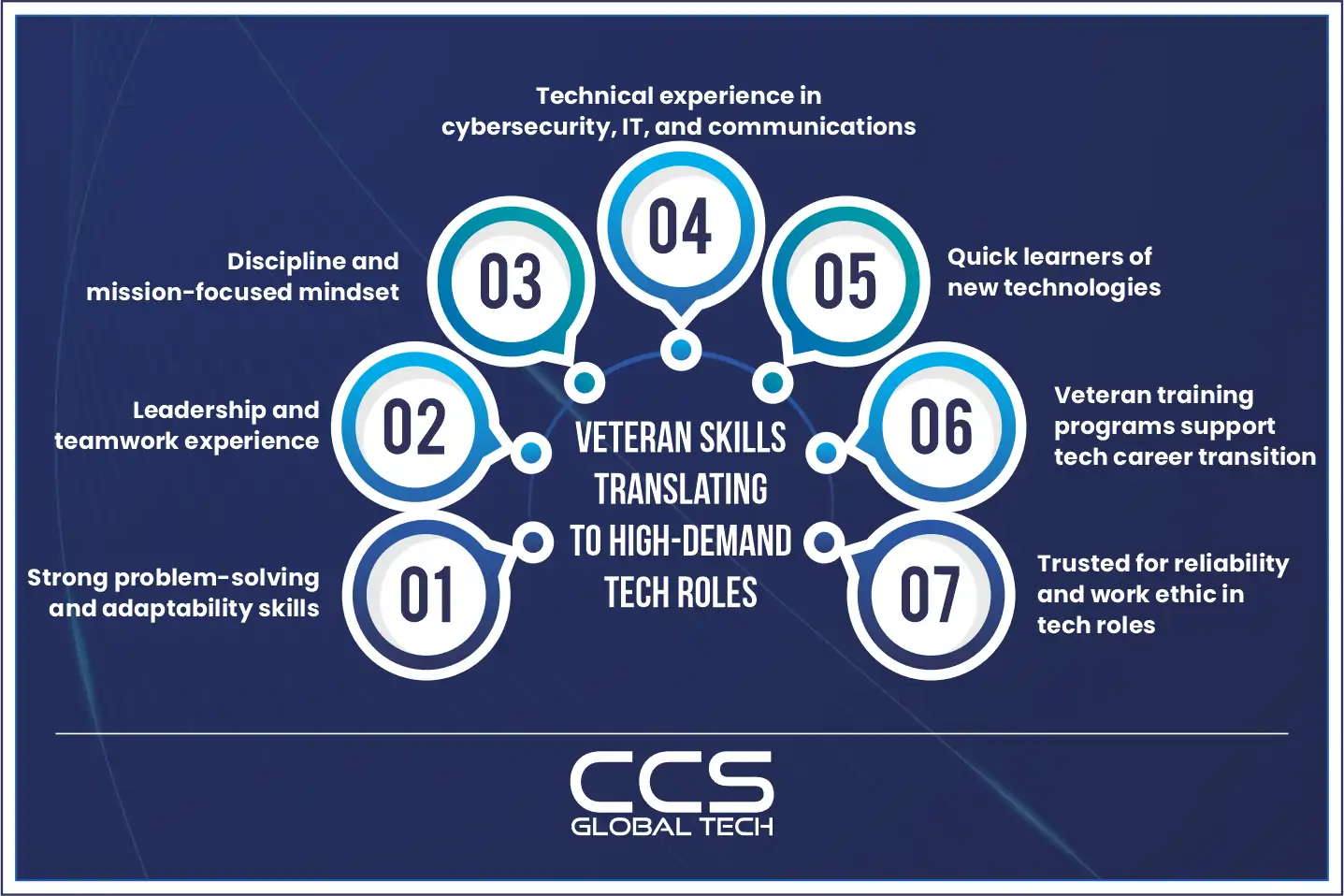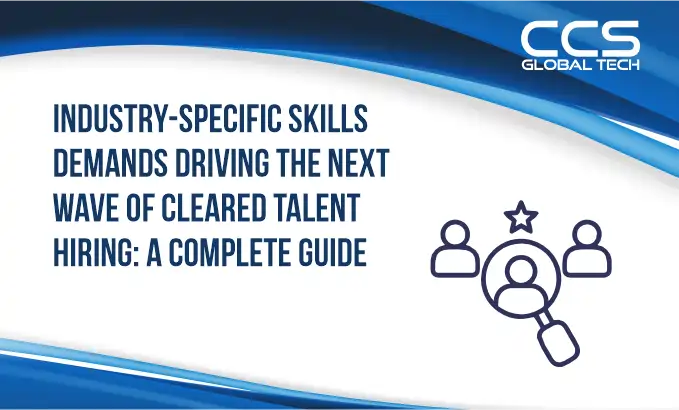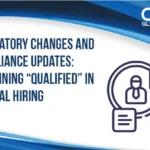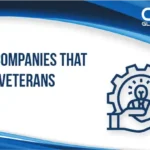Shortly after lunch, the phone rang. Sarah, the head of engineering at a leading defense contractor, sounded anxious. She stated, “We just won the bid for Project Chimera, but there’s a problem.” The client’s specifications are more complex than anything we have worked on. Each member of our team must have a TS/SCI clearance and possess specialized knowledge of autonomous systems and quantum cryptography. Although we have the work, we lack the personnel.
Sarah is not alone in her struggle. Hiring cleared talent was discussed as a numbers game for a lot of years. You searched for a clearance because you needed one. However, that strategy is, unfortunately, now outdated because of technological improvements.
This has created a fascinating new dynamic in the talent market. According to a recent analysis by ClearanceJobs, there are roughly 70,000 more positions than there are people with clearances to fill them. The gap is widening, particularly for roles that require highly technical expertise in areas like:
Cybersecurity & IT: The battleground of the digital age has long arrived. Businesses are in a dire need of data analysts and cybersecurity engineers who can safeguard classified networks and fend off advanced attacks.
- Growing Demand: Information security analyst employment is expected to increase by 29% between 2024 and 2034, according to the US Bureau of Labor Statistics. This rate is significantly higher than the average for all occupations. An average of 16,000 new jobs are anticipated to be created annually as a result of this growth.
- High Compensation: Reflecting the high demand, the median annual wage for information security analysts was $124,910 in May 2024. The top 10% of earners made more than $186,420 per year.
- Persistent Shortfall: According to an ISC2 report from 2023, the cybersecurity workforce only grew by 8.7% annually, whereas it needs to grow by 12.6% annually to meet demand. According to the report, there is a shortage of about 4 million cybersecurity professionals worldwide.
Engineering: The demand for experts in software development and systems engineering has never been higher, from naval systems to aerospace systems. Engineers are frequently employed in the defense sector, where security clearance is a pressing, and a crucial, requirement.
- Steady Growth: Employment of aerospace engineers is projected to grow 6% from 2024 to 2034, faster than the average for all occupations. This growth is expected to create about 4,500 new jobs per year.
- High-Paying Roles: The median annual wage for aerospace engineers was $134,830 in May 2024. For those in the defense and national security sectors, compensation is often higher.
- Talent Gap: Despite the demand, there are challenges in attracting talent. The Aerospace Industries Association notes that the aerospace and defense workforce grew by over 100,000 employees in 2024, with average wages 56% higher than the national average, demonstrating the industry’s need to compete for skilled labor.
AI and Quantum: The competition for engineers and data scientists who can create the next generation of defense technology is fierce as the Department of Defense pushes the limits of artificial intelligence and quantum computing.
- AI’s Rapid Expansion: Since 2016, jobs that require AI skills have been growing faster than all other jobs, and they pay nearly 25% higher wages than their non-AI-skilled counterparts. Unique job postings for Generative AI Engineers have grown sevenfold from 2022 to 2024. The median salary for an AI engineer is approximately $145,080 in the U.S.
- Quantum’s Exponential Growth: The global quantum computing market is projected to reach up to $22 billion by 2030. This rapid growth is reflected in the job market, with the number of quantum computing job postings increasing by over 450% between 2018 and 2023.
- Severe Talent Shortage: The demand for quantum professionals far exceeds the supply, indicating a 3:1 gap between job openings and qualified candidates. The average salary for a quantum computing engineer in the U.S. is between $125,000 and $180,000 per year, highlighting the premium placed on this expertise.
This is where the story of a new kind of talent pool begins, where candidates who have already spent their careers living and breathing this mission.
A Marine Corps member’s duties during service included protecting classified communication networks, doing real-time data analysis, and adjusting to quickly changing threats in demanding situations. Despite not having the title “cybersecurity engineer” in their official job description, their experience is a perfect fit. Their everyday existence served as a master class in collaboration, problem-solving, and mission-driven execution.
Veterans routinely have lower unemployment rates than the general population, according to a Bureau of Labor Statistics report. This isn’t a coincidence. It’s evidence that their military education has already given them the self-control, fortitude, and flexibility that the business sector sorely lacks. They bring a plethora of validated, practical skills to the table in addition to their clearance.

The Playbook: A Guide for Companies Ready for the Next Chapter
So, how can companies like Sarah’s rewrite a more successful chapter in their cleared talent strategy?
Stop Reading the Resume, Start Translating the Mission
Don’t let unfamiliar military acronyms be a barrier. A “13B Cannon Crewmember” has invaluable skills in logistics, teamwork, and managing complex equipment. A “35N Signals Intelligence Analyst” is a ready-made data and cybersecurity pro. The key is to look beyond the title and see the skill.
The military is a massive, high-stakes training ground for the civilian workforce. Veterans possess a unique blend of hard and soft skills that are often overlooked by recruiters who don’t understand the lexicon.
Valuable Certifications and Education
Many veterans have degrees and certifications in addition to their on-the-job training. The percentage of veterans with a bachelor’s degree or higher is steadily increasing, with 69.1% having one as of 2023. Additionally, according to a Lumina Foundation report, veterans are 57% more likely than their peers who are not veterans to hold a professional certificate or certification among adults without a degree. This indicates that they have already received training in the particular, in-demand skills that your business requires.
Highly Transferable Hard Skills
The Census Bureau’s Veterans Employment Outcomes data shows that veterans with specialized military training, such as former drone operators, have some of the highest earnings after leaving service. This is a direct result of their skills being highly valued by civilian employers in fields like professional services and technology.
Focus on Purpose
For a mission, veterans are wired. Presenting a job should be framed as an extension of their service rather than just a role. Show them how their efforts will directly advance technology, safeguard the country, or further a vital goal. There are observable advantages to this purpose-driven approach.
Superior Retention Rates
Employers who successfully hire veterans report higher retention rates. Veterans remain with their original employer 8.3% longer than non-veterans, according to a U.S. Chamber of Commerce Foundation study. This directly lowers the high expenses of hiring new staff, training them, and replacing lost output that come with employee turnover.
Proven Leadership and Soft Skills
In a 2022 survey by the Center for American Progress, veterans were found to be more likely to be employed in executive or senior-level positions than their non-veteran counterparts.
This is not a coincidence. A 2022 Harris Poll for the University of Phoenix found that the most important qualities veterans believe they bring to a civilian organization are leadership skills (54%), teamwork (51%), and the ability to adapt quickly (49%).
Partner with the Experts
The market for cleared talent is a labyrinth. The best course of action is to collaborate with a staffing company that speaks both corporate America and the language of military service. You can save time and money by hiring a specialized company like CCS Global Tech, which can recognize a veteran’s special skill set, translate it for your company, and guarantee a smooth hiring process.
Significant Reduction in Hiring Time
Staffing services are an optimal solution for businesses, helping them cut up to 70% of the time spent finding suitable candidates. While the national average time-to-fill for a position can be over 40 days, specialized recruiters can often present a short list of highly qualified, cleared candidates within days or even hours.
Reduced Costs and Risks
Every day a position remains unfilled costs an organization money. A specialized staffing firm reduces these costs by lowering the time-to-fill. Additionally, by outsourcing the initial screening, skill checks, and background verification, you reduce the risk of a bad hire, an expensive problem for any business, allowing you to focus on evaluating top-tier talent.
The Final Say
The old way of hiring is over. The next wave of cleared talent is already here, ready and waiting. By shifting your perspective and embracing a skills-first approach, your company can not only fill its most critical roles but also gain a competitive advantage by tapping into a talent pool that is unmatched in its discipline, loyalty, and unwavering commitment to the mission.
At CCS Global Tech, we specialize in connecting federal agencies and contractors with mission-ready, security-cleared talent. Our proven frameworks reduce hiring time, lower costs, and ensure you get the right people in the right roles, exactly when you need them. What are you waiting for? Start building your next generation of cleared talent.
FAQs
Q1 – What industries are creating the highest demand for cleared talent right now?
A: Sectors like defense, cybersecurity, aerospace, and intelligence are leading cleared hiring due to growing national security priorities and advanced tech adoption.
Q2 – How are industry-specific skill demands shaping the cleared talent market?
A: Agencies now seek specialized skills—cyber defense, AI/ML, cloud engineering, and advanced analytics—making general IT skills insufficient for cleared roles.
Q3 – Why is cybersecurity expertise critical for cleared professionals today?
A: With federal agencies facing sophisticated cyber threats, cleared professionals with security engineering, threat intelligence, and zero-trust expertise are in highest demand.
Q4 – How do AI and emerging technologies impact cleared talent hiring?
A: AI, automation, and quantum computing require cleared professionals with cutting-edge technical knowledge, driving a wave of new qualification benchmarks.
Q5 – What skills gaps are federal contractors struggling to fill in cleared roles?
A: Contractors face shortages in cloud security, DevSecOps, advanced analytics, and critical infrastructure protection—roles that require both clearance and niche expertise.
Q6 – How does industry specialization affect cleared salary benchmarks?
A: Salaries for cleared professionals rise significantly when roles demand niche expertise, with cybersecurity and AI-related clearances often commanding premium pay.
Q7 – What strategies help contractors meet industry-specific cleared hiring needs?
A: Contractors succeed by building talent pipelines early, upskilling existing cleared staff, and leveraging workforce development programs like DoD SkillBridge.
Q8 – How are regulatory and compliance factors influencing cleared hiring trends?
A: Compliance with DFARS, CMMC, and NIST standards is reshaping cleared job requirements, making security certifications and ongoing training essential.
Q9 – What role do veterans play in meeting industry-specific cleared talent shortages?
A: Veterans bring transferable skills, leadership, and existing clearances, making them ideal candidates for hard-to-fill technical and security-focused cleared roles.
Q10 – How can organizations future-proof cleared hiring against evolving industry demands?
A: Companies must adopt continuous training, invest in AI-driven workforce planning, and partner with specialized staffing firms to stay ahead of skill shifts.






